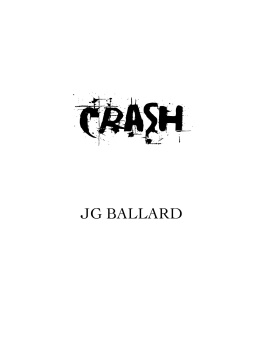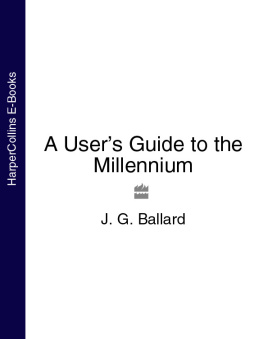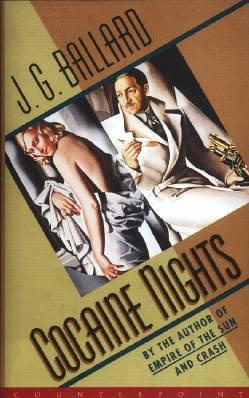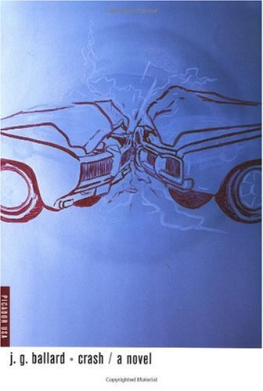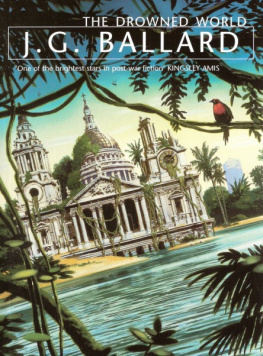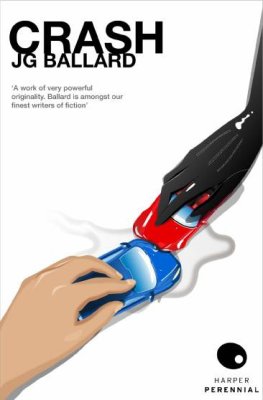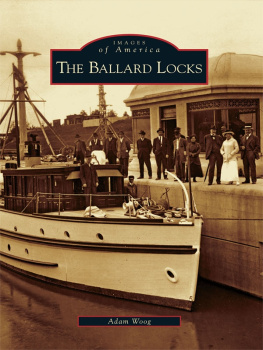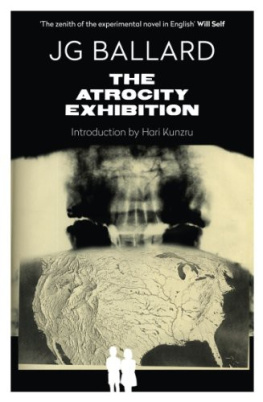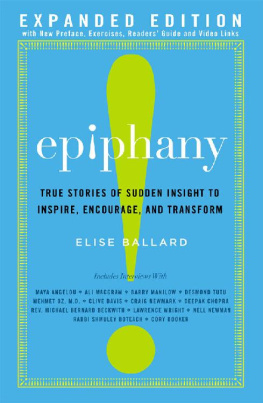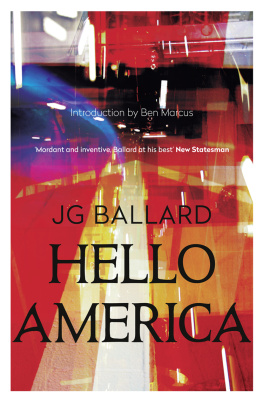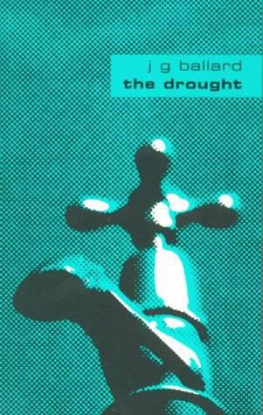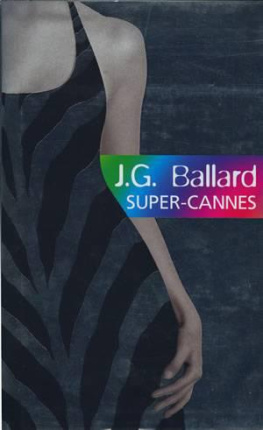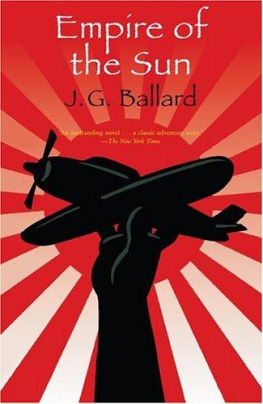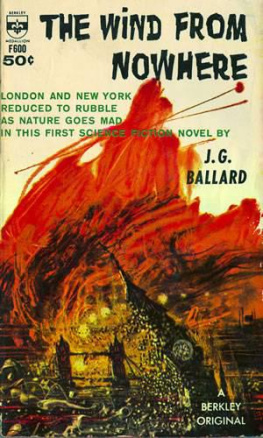J. G. Ballard - Crash: A Novel
Here you can read online J. G. Ballard - Crash: A Novel full text of the book (entire story) in english for free. Download pdf and epub, get meaning, cover and reviews about this ebook. year: 2001, publisher: Picador, genre: Detective and thriller. Description of the work, (preface) as well as reviews are available. Best literature library LitArk.com created for fans of good reading and offers a wide selection of genres:
Romance novel
Science fiction
Adventure
Detective
Science
History
Home and family
Prose
Art
Politics
Computer
Non-fiction
Religion
Business
Children
Humor
Choose a favorite category and find really read worthwhile books. Enjoy immersion in the world of imagination, feel the emotions of the characters or learn something new for yourself, make an fascinating discovery.
- Book:Crash: A Novel
- Author:
- Publisher:Picador
- Genre:
- Year:2001
- Rating:4 / 5
- Favourites:Add to favourites
- Your mark:
- 80
- 1
- 2
- 3
- 4
- 5
Crash: A Novel: summary, description and annotation
We offer to read an annotation, description, summary or preface (depends on what the author of the book "Crash: A Novel" wrote himself). If you haven't found the necessary information about the book — write in the comments, we will try to find it.
Crash: A Novel — read online for free the complete book (whole text) full work
Below is the text of the book, divided by pages. System saving the place of the last page read, allows you to conveniently read the book "Crash: A Novel" online for free, without having to search again every time where you left off. Put a bookmark, and you can go to the page where you finished reading at any time.
Font size:
Interval:
Bookmark:
CRASH
CRASH. Copyright 1973 by J. G. Ballard.
First published in the United States by Farrar, Strauss and Giroux.
The marriage of reason and nightmare that has dominated the 20th century has given birth to an ever more ambiguous world. Across the communications landscape move the spectres of sinister technologies and the dreams that money can buy. Thermo-nuclear weapons systems and soft-drink commercials coexist in an overlit realm ruled by advertising and pseudo-events, science and pornography. Over our lives preside the great twin leitmotifs of the 20th century sex and paranoia.
Increasingly, our concepts of past, present and future are being forced to revise themselves. Just as the past, in social and psychological terms, became a casualty of Hiroshima and the nuclear age, so in its turn the future is ceasing to exist, devoured by the all-voracious present. We have annexed the future into the present, as merely one of those manifold alternatives open to us. Options multiply around us, and we live in an almost infantile world where any demand, any possibility, whether for life-styles, travel, sexual roles and identities, can be satisfied instantly.
In addition, I feel that the balance between fiction and reality has changed significantly in the past decades. Increasingly their roles are reversed. We live in a world ruled by fictions of every kind mass-merchandizing, advertising, politics conducted as a branch of advertising, the pre-empting of any original response to experience by the television screen. We live inside an enormous novel. It is now less and less necessary for the writer to invent the fictional content of his novel. The fiction is already there. The writers task is to invent the reality. In the past we have always assumed that the external world around us has represented reality, however confusing or uncertain, and that the inner world of our minds, its dreams, hopes, ambitions, represented the realm of fantasy and the imagination. These roles, it seems to me, have been reversed. The most prudent and effective method of dealing with the world around us is to assume that it is a complete fiction
conversely, the one small node of reality left to us is inside our own heads. Freuds classic distinction between the latent and manifest content of the dream, between the apparent and the real, now needs to be applied to the external world of so-called reality.
Given these transformations, what is the main task facing the writer? Can he, any longer, make use of the techniques and perspectives of the traditional 19th century novel, with its linear narrative, its measured chronology, its consular characters grandly inhabiting their domains within an ample time and space? Is his subject matter the sources of character and per-sonality sunk deep in the past, the unhurried inspection of roots, the examination of the most subtle nuances of social behaviour and personal relationships? Has the writer still the moral authority to invent a self-sufficient and self-enclosed world, to preside over his characters like an examiner, knowing all the questions in advance? Can he leave out anything he prefers not to understand, including his own motives, prejudices and psychopathology?
I feel myself that the writers role, his authority and licence to act, have changed radically. I feel that, in a sense, the writer knows nothing any longer. He has no moral stance. He offers the reader the contents of his own head, a set of options and imaginative alternatives. His role is that of the scientist, whether on safari or in his laboratory, faced with an unknown terrain or subject. All he can do is to devise various hypotheses and test them against the facts.
Crash is such a book, an extreme metaphor for an extreme situation, a kit of desperate measures only for use in an extreme crisis. Crash, of course, is not concerned with an imaginary disaster, however imminent, but with a pandemic cataclysm that kills hundreds of thousands of people each year and injures millions. Do we see, in the car crash, a sinister portent of a nightmare marriage between sex and technology? Will modern technology provide us with hitherto undreamed-of means for tapping our own psychopathologies? Is this harnessing of our innate perversity conceivably of benefit to us?
Is there some deviant logic unfolding more powerful than that provided by reason?
Throughout Crash I have used the car not only as a sexual image, but as a total metaphor for mans life in todays society. As such the novel has a political role quite apart from its sexual content, but I would still like to think that Crash is the first pornographic novel based on technology. In a sense, pornography is the most political form of fiction, dealing with how we use and exploit each other, in the most urgent and ruthless way.
Needless to say, the ultimate role of Crash is cautionary, a warning against that brutal, erotic and overlit realm that beckons more and more persuasively to us from the margins of the technological landscape.
J. G. Ballard
1995
VAUGHAN died yesterday in his last car-crash. During our friendship he had rehearsed his death in many crashes, but this was his only true accident. Driven on a collision: course towards the limousine of the film actress, his car jumped the rails of the London Airport flyover and plunged through the roof of a bus filled with airline passengers. The crushed bodies of package tourists, like a haemorrhage of the sun, still lay across the vinyl seats when I pushed my way through the police engineers an hour later. Holding the arm of her chauffeur, the film actress Elizabeth Taylor, with whom Vaughan had dreamed of dying for so many months, stood alone under the revolving ambulance lights. As I knelt over Vaughans body she placed a gloved hand to her throat.
Could she see, in Vaughans posture, the formula of the death which he had devised for her? During the last weeks of his life Vaughan thought of nothing else but her death, a coronation of wounds he had staged with the devotion of an Earl Marshal. The walls of his apartment near the film studios at Shepperton were covered with the photographs he had taken through his zoom lens each morning as she left her hotel in London, from the pedestrian bridges above the westbound motorways, and from the roof of the multi-storey car-park at the studios. The magnified details of her knees and hands, of the inner surface of her thighs and the left apex of her mouth, I uneasily prepared for Vaughan on the copying machine in my office, handing him the packages of prints as if they were the installments of a death warrant. At his apartment I watched him matching the details of her body with the photographs of grotesque wounds in a textbook of plastic surgery. In his vision of a car-crash with the actress, Vaughan was obsessed by many wounds and impacts - by the dying chromium and collapsing bulkheads of their two cars meeting head-on in complex collisions endlessly repeated in slow-motion films, by the identical wounds inflicted on their bodies, by the image of windshield glass frosting around her face as she broke its tinted surface like a death-born Aphrodite, by the compound fractures of their thighs impacted against their handbrake mountings, and above all by the wounds to their genitalia, her uterus pierced by the heraldic beak of the manufacturers medallion, his semen emptying across the luminescent dials that registered for ever the last temperature and fuel levels of the engine.
It was only at these times, as he described this last crash to me, that Vaughan was calm. He talked of these wounds and collisions with the erotic tenderness of a long-separated lover. Searching through the photographs in his apartment, he half turned towards me, so that his heavy groin quietened me with its profile of an almost erect penis. He knew that as long as he provoked me with his own sex, which he used casually as if he might discard it for ever at any moment, I would never leave him.
Next pageFont size:
Interval:
Bookmark:
Similar books «Crash: A Novel»
Look at similar books to Crash: A Novel. We have selected literature similar in name and meaning in the hope of providing readers with more options to find new, interesting, not yet read works.
Discussion, reviews of the book Crash: A Novel and just readers' own opinions. Leave your comments, write what you think about the work, its meaning or the main characters. Specify what exactly you liked and what you didn't like, and why you think so.

